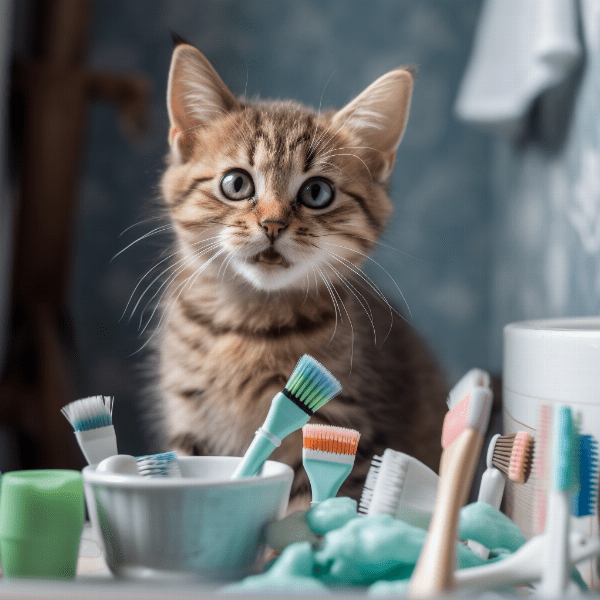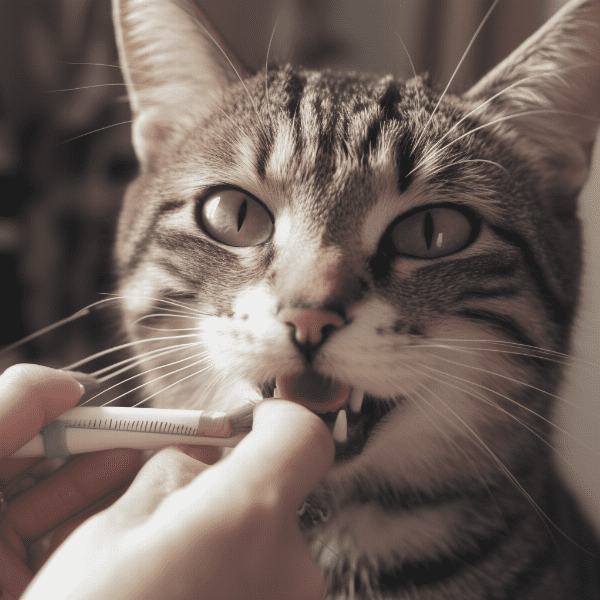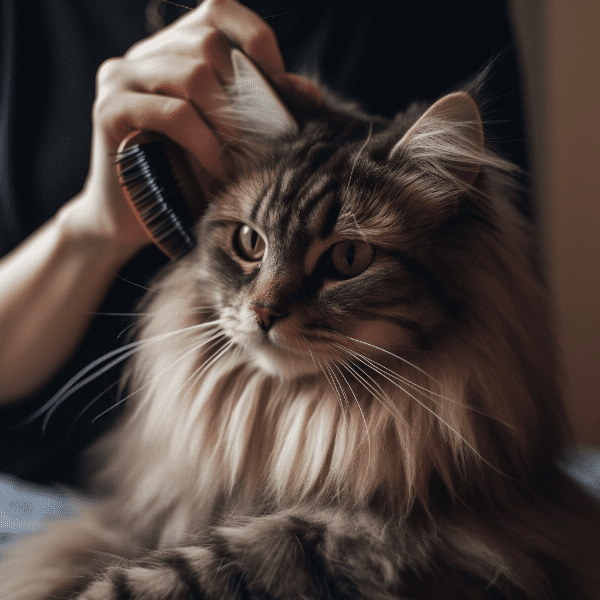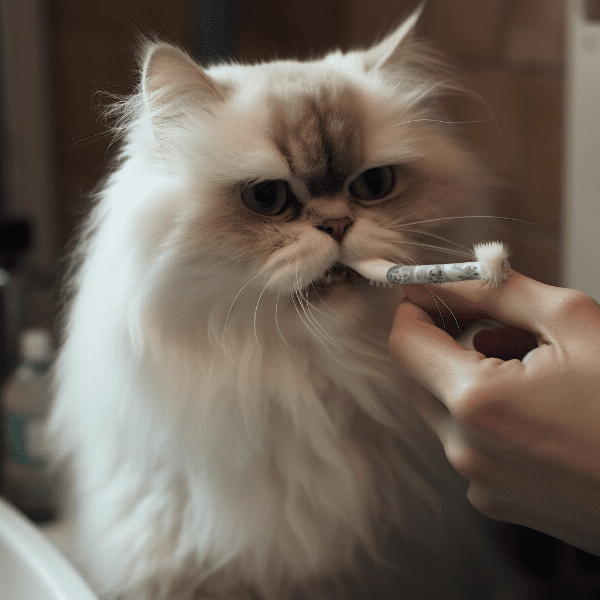Table of Contents
- Why Brushing Your Kitten’s Teeth is Important
- When to Start Brushing Your Kitten’s Teeth
- Choosing the Right Toothbrush and Toothpaste
- Getting Your Kitten Used to Toothbrushing
- Proper Brushing Technique for Kitten Teeth
- Common Mistakes to Avoid When Brushing Kitten Teeth
- Supplementing Brushing with Other Dental Care
- Signs of Dental Problems in Kittens
- When to Visit a Vet for Dental Care
- Keeping Your Kitten’s Teeth Healthy for Life
Why Brushing Your Kitten’s Teeth is Important
Good oral hygiene is just as important for your kitten’s health as it is for your own. Regular brushing of your kitten’s teeth can prevent a number of dental problems that can lead to pain, infection, and even serious health issues. Here are some reasons why brushing your kitten’s teeth is crucial:
Prevents Gum Disease
Gum disease is a common problem in cats and can be caused by the buildup of plaque and bacteria on their teeth. Brushing your kitten’s teeth regularly helps remove this buildup and prevents gum disease from developing. If left untreated, gum disease can lead to tooth loss, bad breath, and even systemic infections.
Reduces Risk of Tooth Decay
Tooth decay is another common problem in cats and can be caused by a diet high in sugar and carbohydrates. Brushing your kitten’s teeth regularly helps remove any leftover food particles that can contribute to tooth decay. By reducing the risk of tooth decay, you can prevent your kitten from experiencing the pain and discomfort that comes with it.
Helps Identify Dental Issues Early On
Regular brushing of your kitten’s teeth also allows you to inspect their mouth for any signs of dental problems, such as broken or loose teeth, swollen gums, or other abnormalities. Catching these issues early on can prevent them from becoming more serious and requiring more extensive treatment.
Improves Overall Health
Brushing your kitten’s teeth regularly can also have a positive impact on their overall health. By preventing dental problems, you can reduce the risk of systemic infections, which can be life-threatening in some cases. Additionally, good oral hygiene has been linked to a lower risk of other health issues, such as heart disease and diabetes.
In conclusion, brushing your kitten’s teeth is an important aspect of their overall health and wellbeing. By taking the time to establish a regular brushing routine, you can prevent dental problems, catch any issues early on, and improve their overall health.
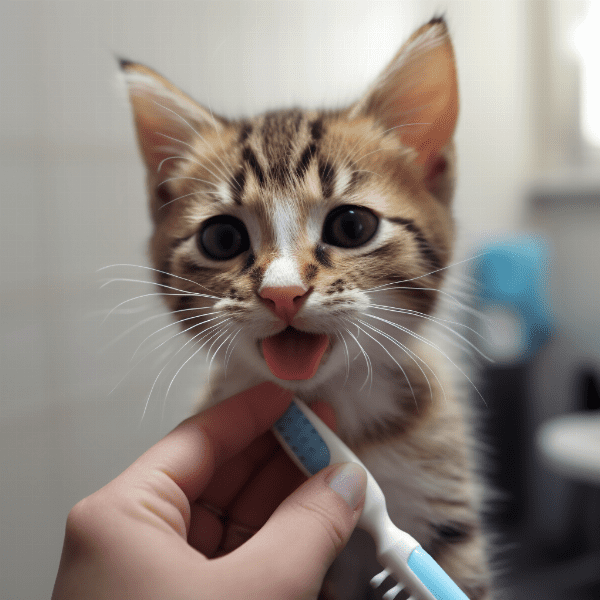
When to Start Brushing Your Kitten’s Teeth
Starting your kitten on a regular brushing routine as early as possible can help them get used to the process and make it easier for you to maintain good oral hygiene throughout their life. Here are some things to consider when determining when to start brushing your kitten’s teeth:
Age
It’s recommended to start brushing your kitten’s teeth when they are around 12 weeks old. At this age, their adult teeth are starting to come in, and establishing a brushing routine early on can help prevent any dental problems from developing.
Comfort Level
It’s important to wait until your kitten is comfortable with you handling their mouth before attempting to brush their teeth. Spend time getting your kitten used to you touching their face and opening their mouth, and gradually introduce the toothbrush and toothpaste.
Frequency of Meals
Kittens who eat wet food or frequent meals may require more frequent brushing to prevent food from sticking to their teeth and causing dental problems. Talk to your veterinarian to determine how often you should be brushing your kitten’s teeth based on their diet and eating habits.
Health Issues
If your kitten has any existing dental issues, such as inflamed gums or broken teeth, it’s important to wait until these issues have been resolved before starting a brushing routine. Your veterinarian can help you determine when it’s safe to start brushing your kitten’s teeth.
In conclusion, starting a regular brushing routine for your kitten as early as possible can help prevent dental problems and make it easier for you to maintain good oral hygiene throughout their life. Consider your kitten’s age, comfort level, eating habits, and health issues when determining when to start brushing their teeth.

Choosing the Right Toothbrush and Toothpaste
Selecting the right toothbrush and toothpaste for your kitten is an important part of establishing a successful brushing routine. Here are some things to consider when choosing the right toothbrush and toothpaste for your kitten:
Toothbrush
When it comes to selecting a toothbrush for your kitten, look for one that is specifically designed for cats. These toothbrushes are typically smaller and have softer bristles, making them easier to use on your kitten’s small teeth and sensitive gums.
Another option is to use a finger toothbrush, which fits over your finger and allows you to brush your kitten’s teeth with more precision. These toothbrushes are a good choice for kittens who are resistant to a traditional toothbrush.
Toothpaste
Choosing the right toothpaste for your kitten is also important. Avoid using human toothpaste, which can be harmful to your kitten if ingested. Instead, look for a toothpaste that is specifically formulated for cats.
Flavored toothpaste can make brushing more enjoyable for your kitten and encourage them to participate in the process. Some popular flavors include chicken, fish, and beef.
Consult with Your Veterinarian
If you’re unsure which toothbrush or toothpaste to use, consult with your veterinarian. They can recommend products that are safe and effective for your kitten’s specific needs.
In conclusion, choosing the right toothbrush and toothpaste for your kitten can make a big difference in the success of their brushing routine. Look for toothbrushes that are specifically designed for cats and toothpaste that is formulated for their unique needs. Consult with your veterinarian if you’re unsure which products to use.
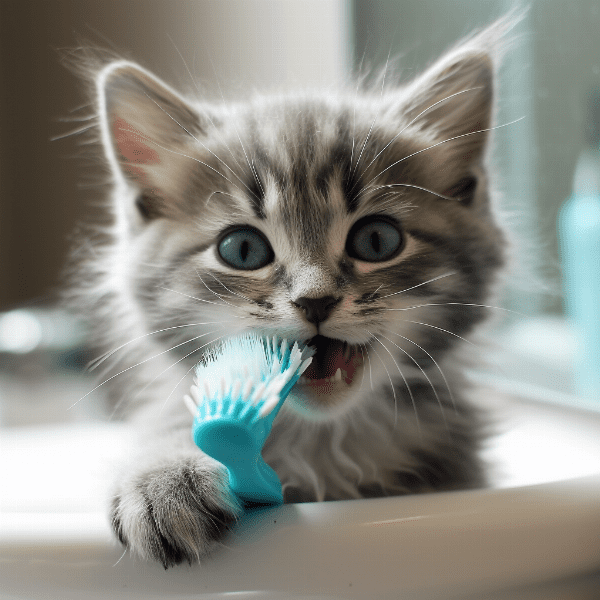
Getting Your Kitten Used to Toothbrushing
Getting your kitten used to toothbrushing can take time and patience, but it’s an important part of maintaining their oral health. Here are some tips to help you get started:
Start Slowly
Introduce the toothbrush and toothpaste to your kitten gradually. Start by allowing them to sniff and taste the toothpaste, and then move on to rubbing the toothpaste on their teeth with your finger. This can help them get used to the sensation of having their teeth brushed.
Use Positive Reinforcement
Reward your kitten for their cooperation during the brushing process. Offer treats, verbal praise, and affection to help create positive associations with toothbrushing.
Be Patient
It’s important to be patient with your kitten during the toothbrushing process. If they become resistant or anxious, take a break and try again later. Remember that it may take several weeks or even months for your kitten to get used to the toothbrushing routine.
Keep Sessions Short
Start with short brushing sessions and gradually increase the length of time as your kitten becomes more comfortable. Try to brush your kitten’s teeth at the same time each day to establish a routine.
Make it a Positive Experience
Make toothbrushing a positive experience for your kitten by creating a comfortable and relaxing environment. Use a soft and reassuring tone of voice and try to make the experience as stress-free as possible.
In conclusion, getting your kitten used to toothbrushing can take time and patience, but it’s an important part of maintaining their oral health. Start slowly, use positive reinforcement, be patient, keep sessions short, and make it a positive experience for your kitten. By following these tips, you can establish a successful toothbrushing routine for your kitten.
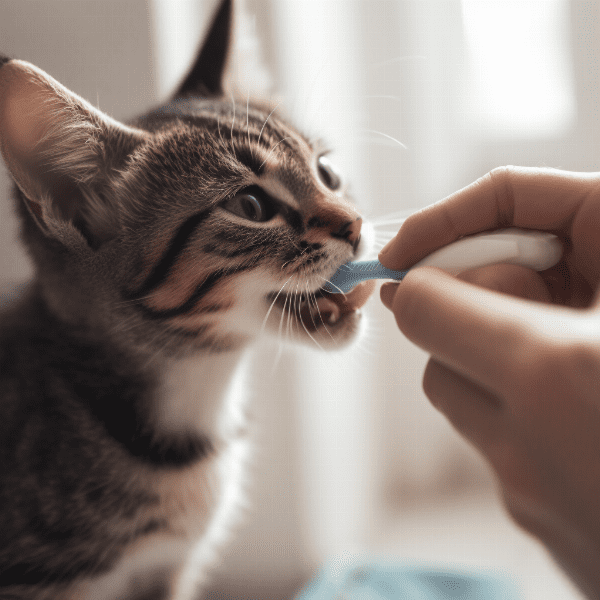
Proper Brushing Technique for Kitten Teeth
Proper brushing technique is crucial for maintaining your kitten’s oral health. Here are some steps to follow for effective brushing:
Step 1: Positioning
Find a comfortable and secure spot to brush your kitten’s teeth. You can try holding your kitten in your lap, or placing them on a flat surface such as a table or countertop. Make sure your kitten is calm and relaxed before starting the brushing process.
Step 2: Toothpaste Application
Apply a small amount of toothpaste to the toothbrush or your finger. Allow your kitten to taste and smell the toothpaste before starting the brushing process.
Step 3: Brushing
Gently brush your kitten’s teeth in a circular motion, focusing on the gum line where bacteria and plaque tend to accumulate. Brush the outer and inner surfaces of the teeth, as well as the molars in the back of the mouth.
Step 4: Reward
After you’ve finished brushing your kitten’s teeth, offer them a treat or praise to reinforce the positive experience.
Step 5: Repeat
Repeat the brushing process daily, gradually increasing the length of time as your kitten becomes more comfortable with the process.
- Use a toothbrush and toothpaste specifically designed for cats.
- Brush your kitten’s teeth at the same time each day to establish a routine.
- Be gentle and patient with your kitten during the brushing process.
- Reward your kitten for their cooperation with treats and praise.
In conclusion, proper brushing technique is essential for maintaining your kitten’s oral health. Follow these steps to ensure effective brushing and establish a successful toothbrushing routine for your kitten. Remember to use a toothbrush and toothpaste specifically designed for cats, be gentle and patient, and offer positive reinforcement to make the experience a positive one for your kitten.
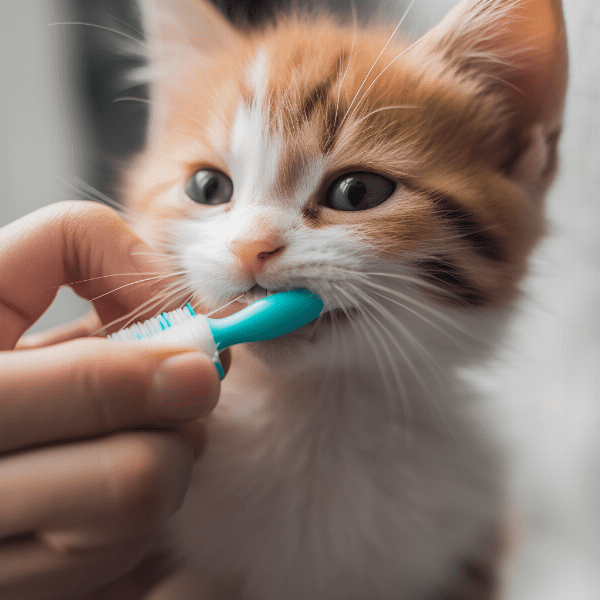
Common Mistakes to Avoid When Brushing Kitten Teeth
Brushing your kitten’s teeth can be a challenging process, and it’s important to avoid common mistakes that can make the process even more difficult. Here are some mistakes to avoid when brushing your kitten’s teeth:
Mistake 1: Using Human Toothpaste
Human toothpaste can be harmful to cats if ingested, as it contains ingredients that can be toxic to them. Always use a toothpaste specifically formulated for cats.
Mistake 2: Using a Hard or Large Toothbrush
Using a toothbrush that is too large or too hard can cause discomfort or even pain for your kitten. Look for a toothbrush that is specifically designed for cats and has soft bristles.
Mistake 3: Brushing Too Hard
Brushing too hard can cause gum irritation and bleeding, which can make your kitten reluctant to have their teeth brushed in the future. Be gentle and use a light touch when brushing your kitten’s teeth.
Mistake 4: Skipping Brushing Sessions
Skipping brushing sessions can lead to the buildup of plaque and bacteria on your kitten’s teeth, which can lead to dental problems over time. Establish a regular brushing routine and stick to it to ensure your kitten’s oral health.
Mistake 5: Not Rewarding Your Kitten
Rewarding your kitten for their cooperation during the brushing process can help create positive associations with toothbrushing and make the process more enjoyable for them. Offer treats and verbal praise to reinforce good behavior.
Mistake 6: Neglecting Dental Checkups
Regular dental checkups with your veterinarian are an important part of maintaining your kitten’s oral health. They can help identify any dental problems early on and provide treatment before they become more serious.
In conclusion, avoiding these common mistakes can make the toothbrushing process easier and more successful for you and your kitten. Always use a toothpaste specifically formulated for cats, use a toothbrush with soft bristles, be gentle, establish a regular brushing routine, reward your kitten, and don’t neglect dental checkups. By following these tips, you can help ensure your kitten’s oral health for years to come.

Supplementing Brushing with Other Dental Care
While regular brushing is essential for your kitten’s oral health, there are other ways to supplement their dental care routine. Here are some additional dental care practices to consider:
Dental Treats and Chews
Dental treats and chews can help remove plaque and tartar buildup from your kitten’s teeth. Look for products that are specifically designed to promote dental health and avoid those that contain ingredients that can be harmful to your kitten.
Water Additives
Water additives can help promote dental health by reducing plaque and bacteria in your kitten’s mouth. They can be added to your kitten’s drinking water and are an easy way to provide additional dental care.
Professional Dental Cleanings
Professional dental cleanings by your veterinarian can help remove any plaque and tartar buildup that may have accumulated on your kitten’s teeth. These cleanings are typically performed under anesthesia and may be necessary if your kitten has significant dental problems.
Toys and Bones
Toys and bones that are specifically designed for dental health can help remove plaque and tartar buildup from your kitten’s teeth. Look for products that are made from durable materials and avoid those that can be easily broken or ingested.
In conclusion, supplementing brushing with other dental care practices can help promote your kitten’s oral health. Consider using dental treats and chews, water additives, professional dental cleanings, a balanced diet, and toys and bones to support your kitten’s dental care routine. Talk to your veterinarian for recommendations on the best products and practices for your kitten’s specific needs.
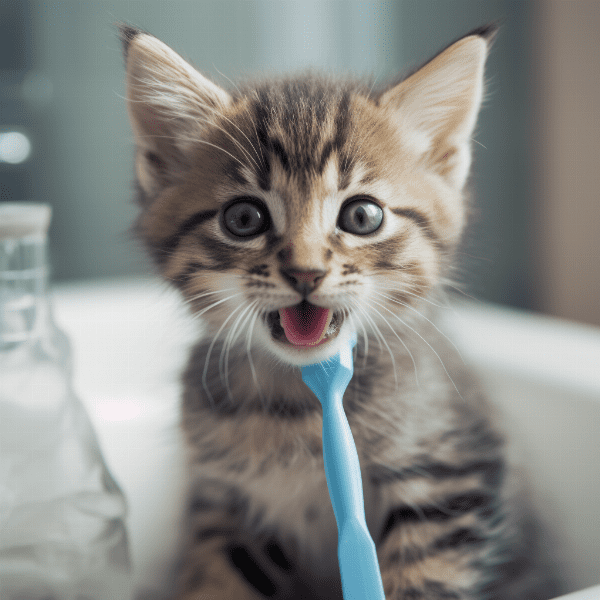
Signs of Dental Problems in Kittens
Regular dental care is important for maintaining your kitten’s oral health, but sometimes dental problems can still occur. Here are some signs of dental problems to watch out for:
Bad Breath
Bad breath is a common sign of dental problems in kittens. If your kitten’s breath smells unusually foul, it could be a sign of an underlying dental problem.
Pawing at the Mouth
If your kitten is pawing at their mouth or showing signs of discomfort when eating or playing, it could be a sign of a dental problem. This behavior may indicate that your kitten is experiencing pain or discomfort in their mouth.
Drooling
Excessive drooling can also be a sign of dental problems in kittens. If you notice your kitten drooling more than usual or leaving wet spots on their bedding or toys, it could be a sign of an underlying dental issue.
Swollen or Bleeding Gums
Swollen or bleeding gums can indicate that your kitten is experiencing gum disease or other dental problems. If you notice your kitten’s gums appear red, inflamed, or are bleeding, it’s important to seek veterinary care.
In conclusion, watching out for these signs of dental problems in kittens can help ensure prompt treatment and prevent further complications. If you notice any of these signs, it’s important to seek veterinary care as soon as possible to identify and treat any underlying dental issues. Regular dental checkups and a good dental care routine can also help prevent dental problems from developing in the first place.

When to Visit a Vet for Dental Care
Regular dental care is important for your kitten’s oral health, but sometimes professional veterinary care is necessary. Here are some signs that it may be time to visit your veterinarian for dental care:
Persistent Bad Breath
If your kitten’s bad breath persists even after regular brushing and dental care, it could be a sign of an underlying dental problem. A veterinarian can perform a dental examination to identify the cause of the bad breath and provide appropriate treatment.
Difficulty Eating
If your kitten is having difficulty eating or avoiding certain types of food, it could be a sign of a dental issue. A veterinarian can examine your kitten’s teeth and gums to determine the cause of the problem and provide appropriate treatment.
Oral Discomfort or Pain
If your kitten is pawing at their mouth, drooling excessively, or showing other signs of oral discomfort or pain, it’s important to seek veterinary care. These signs could indicate a dental problem or other underlying health issue that requires prompt attention.
Visible Signs of Dental Problems
If you notice visible signs of dental problems in your kitten, such as bleeding gums, broken teeth, or loose teeth, it’s important to seek veterinary care. These signs could indicate a serious dental issue that requires professional treatment.
Regular Dental Checkups
Regular dental checkups with your veterinarian can also help prevent and identify dental problems before they become more serious. Your veterinarian can perform a dental examination and recommend appropriate dental care to keep your kitten’s teeth and gums healthy.
In conclusion, visiting your veterinarian for dental care is important if you notice persistent bad breath, difficulty eating, oral discomfort or pain, visible signs of dental problems, or for regular dental checkups. Seeking prompt veterinary care can help identify and treat dental issues early on and prevent further complications. By following a good dental care routine and seeking veterinary care as needed, you can help ensure your kitten’s oral health for years to come.
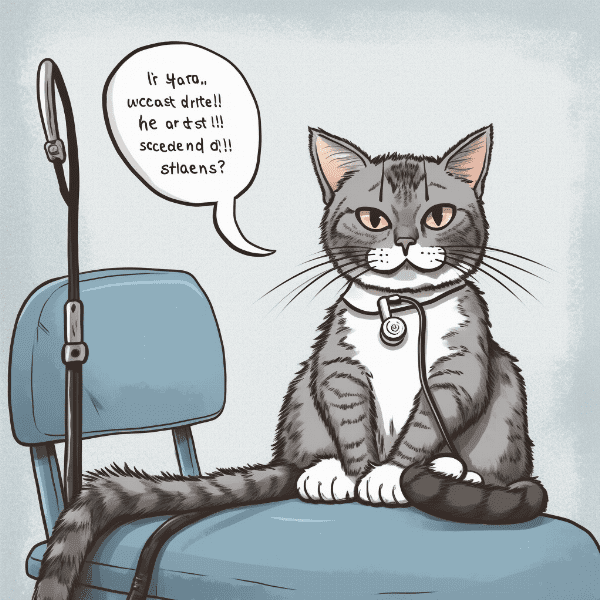
Keeping Your Kitten’s Teeth Healthy for Life
Maintaining your kitten’s oral health is essential for their overall well-being. Here are some tips for keeping your kitten’s teeth healthy for life:
Establish a Regular Dental Care Routine
Establishing a regular dental care routine is essential for maintaining your kitten’s oral health. This includes daily brushing, regular dental checkups with your veterinarian, and supplementing with other dental care practices as needed.
Use Appropriate Dental Products
Using appropriate dental products, such as toothbrushes and toothpaste specifically designed for cats, is important for effective dental care. Avoid using human toothpaste or products that contain ingredients that can be harmful to your kitten.
Feed a Balanced Diet
Feeding your kitten a balanced and healthy diet can also contribute to their dental health. Look for high-quality cat food that is low in carbohydrates and high in protein to help reduce the risk of dental problems.
Provide Plenty of Opportunities for Dental Exercise
Providing your kitten with plenty of opportunities for dental exercise, such as toys and bones designed for dental health, can help keep their teeth clean and healthy.
Watch for Signs of Dental Problems
Watching for signs of dental problems, such as bad breath, difficulty eating, and bleeding gums, is important for identifying and treating dental issues early on.
Seek Veterinary Care as Needed
If you notice any signs of dental problems or if your kitten is due for a regular dental checkup, seek veterinary care as needed. Your veterinarian can perform a dental examination and recommend appropriate treatment to keep your kitten’s teeth and gums healthy.
In conclusion, maintaining your kitten’s oral health requires a regular dental care routine, appropriate dental products, a balanced diet, dental exercise, watching for signs of dental problems, and seeking veterinary care as needed. By following these tips, you can help ensure your kitten’s teeth and gums stay healthy for life.
